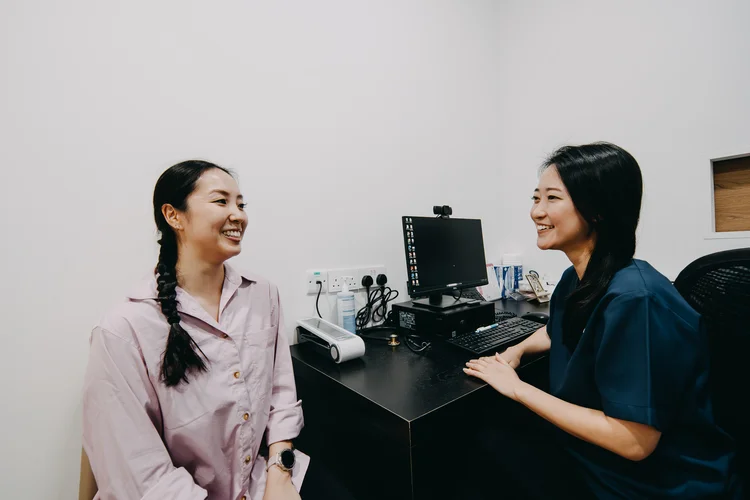Dengue Blood Test
A dengue blood test is essential for diagnosing dengue fever, a viral illness caused by the dengue virus. Four different strains, or serotypes (DENV 1 to 4), circulate in Singapore, with transmission occurring predominantly through the bite of an infected Aedes mosquito. As of July 2024, Singapore has seen over 10,000 cases of dengue, surpassing the total number from 2023, highlighting the importance of awareness and early diagnosis to prevent complications.

Symptoms of Dengue Fever
The symptoms of dengue fever usually manifest 4 to 7 days after being bitten by an infected mosquito. Common symptoms include:
- Sudden high fever lasting 2 to 7 days
- Severe headache with pain behind the eyes
- Muscle and joint pain
- Rashes
- Nausea and vomiting
- Mild bleeding from the nose or gums, or easy bruising of the skin
Severe Dengue
In rare cases, dengue can progress to severe dengue, including conditions such as dengue hemorrhagic fever (DHF) or dengue shock syndrome (DSS). These conditions can lead to life-threatening complications. Warning signs typically appear 3 to 7 days after the initial fever subsides and may include:
- Bleeding from gums, nose, vomit, or stool (black stool)
- Severe abdominal pain
- Frequent vomiting
- Fluid accumulation in the chest and abdomen
- Lethargy and restlessness
Immediate medical attention is essential if these symptoms occur, as early intervention can prevent the progression to severe dengue.

Types of Dengue Blood Tests
Dengue diagnosis requires laboratory testing of blood samples to detect either viral components or the immune system’s response.

NS1 Antigen Test
The NS1 antigen test is among the most common dengue tests in Singapore. It detects the presence of the NS1 protein, a non-structural protein of the dengue virus, in the blood during the early stages of infection, usually within the first week of symptom onset. This test provides quick results and is critical for early diagnosis and management.
IgM & IgG Antibodies Tests
IgM and IgG antibody tests detect the body’s immune response to dengue. IgM antibodies usually appear around 5 days after symptoms begin, indicating a recent infection. IgG antibodies develop later and can persist for months or even years, suggesting a past infection. These tests are particularly useful for confirming the infection during later stages of the disease.
Erythrocyte Sedimentation Rate (ESR)
While not a primary diagnostic tool for dengue, the ESR test helps assess inflammation levels in the body. Elevated ESR levels can support dengue diagnosis in conjunction with other tests but are not definitive on their own.
Dengue Rapid Test
The dengue rapid test uses immunochromatographic technology to detect NS1 antigens or IgM/IgG antibodies in the blood. This test is conducted using a small blood sample, typically obtained from a finger prick. Results are available in approximately 15-20 minutes, making this a fast and convenient initial screening tool.
Dengue Blood Test Price in Singapore
At healthscreening.sg, it usually takes less than 30 minutes to collect a blood sample to test for dengue. The prices are as follows:
| Test | Price* |
|---|---|
| Consultation | $49.05 |
| DEN1 (Full Blood Count, ESR, NS1 Antigen, IgG & IgM Antibodies) | $87.20 |
| DEN2 (NS1 Antigen, IgG & IgM Antibodies) | $76.30 |
| DEN3 (Full Blood Count, ESR, NS1 Antigen, IgG & IgM Antibodies) | $82.84 |
| Dengue Duo Kit (NS1 Antigen, IgG & IgM Antibodies) - Rapid Test | $59.95 |
*Prices are NETT and inclusive of GST.
Treatment for Dengue Fever
There is no specific antiviral medication for dengue fever, but supportive care can significantly improve outcomes. Key strategies to manage dengue symptoms include:
- Hydration: Maintaining adequate fluid intake is essential to prevent dehydration, which can worsen symptoms and lead to complications.
- Medication: Paracetamol is recommended to reduce fever and manage pain. It’s important to avoid medications like aspirin or ibuprofen, as they can increase the risk of bleeding, a common complication in dengue.
- Rest: Adequate rest is vital to allow the body to recover from the infection.
- Monitoring Vital Signs: Regularly checking temperature, blood pressure, and heart rate helps track the severity of the illness and ensure timely medical intervention if symptoms worsen.
In cases of severe dengue, intravenous (IV) fluid replacement and blood transfusions may be required. It is important to seek medical advice from a doctor for appropriate treatment of dengue fever.

Summary
Early detection and accurate diagnosis are important for managing dengue fever effectively. Several blood tests, including the NS1 antigen test, IgM/IgG antibody tests, and PCR tests, are available for timely and accurate detection of the virus. If you suspect dengue infection, especially if you are in or have recently travelled to a dengue-prone area, it is essential to seek medical attention promptly for testing and appropriate care.
How Do I Make an Appointment?
Health Screening Clinics in Singapore
We offer comprehensive health screening services at two conveniently located clinics, both within
walking distance of Tanjong Pagar (EW13) and Orchard Boulevard (TE15) MRT stations.
Our clinics are equipped with advanced diagnostic technologies, including Chest X-ray, Ultrasound, Bone Mass Density (BMD) scanners, and
Treadmill Stress Test machines. Additionally, our Orchard clinic is equipped with a CT (Computed Tomography) scanner,
enabling us to provide more detailed health assessments. Bookings can be easily made via WhatsApp or by
phone.






Navigate Easy With Google Maps
Health Screening Singapore (Anson House)
Nearest MRT: EW15 Tanjong PagarHealth Screening Singapore (Camden Medical Centre)
Nearest MRT: TE13 Orchard BoulevardHealth Screening Singapore (CPF Jurong Building)
Nearest MRT: NS1/EW24 Jurong EastFrequently Asked Questions (FAQ)
Several blood tests are used to diagnose dengue. The key ones include the NS1 antigen test, which detects a viral protein, and the IgM and IgG antibody tests, which reveal the body’s immune response to the virus. Additionally, the PCR test identifies the virus’s genetic material, providing accurate results.
Dengue diagnosis is confirmed via lab tests that detect the virus or the body's antibodies. Often, a combination of the NS1 antigen test and IgM/IgG antibody tests is employed. The PCR test is another highly accurate method, especially for early detection.
In the initial stages of dengue, the NS1 antigen test will yield positive results. After about 5 days, the IgM antibody test turns positive, signifying recent infection, while the IgG antibody test becomes positive later, indicating prior infection.
In Singapore, dengue diagnosis typically involves blood tests such as the NS1 antigen test, IgM and IgG antibody tests, and PCR tests. These services are available at hospitals, polyclinics, and private clinics.
The PCR test is considered the gold standard for early dengue detection, as it can pinpoint the viral RNA with great accuracy. While it’s highly sensitive, this test is also more resource-intensive and time-consuming than other methods.
The NS1 antigen test is the fastest way to diagnose dengue, providing results within hours. It is most effective during the first week of infection.
Doctors diagnose dengue based on a combination of clinical symptoms and confirmatory blood tests, such as the NS1 antigen test, IgM/IgG antibody tests, and PCR test.
A platelet count of fewer than 150,000 cells per microliter can suggest dengue. However, in severe cases, the count may drop further, requiring urgent care. It's important to consider platelet levels along with other diagnostic tests and symptoms.
If you suspect dengue infection, it's essential to consult a healthcare professional for proper lab tests. Home diagnosis is not advisable, as dengue can lead to serious complications if not diagnosed and treated early. Only a doctor can confirm the infection through blood tests and recommend the appropriate course of action.
Dengue fever generally lasts between 2 and 7 days. Once the fever subsides, monitoring for severe dengue symptoms is crucial.
Dengue's early symptoms include a sudden high fever, severe headache, pain behind the eyes, and muscle/joint pain. These typically arise 4 to 7 days after a mosquito bite.
A dengue blood test report shows whether the NS1 antigen, IgM antibodies, or IgG antibodies are present. A positive NS1 or IgM result indicates a recent infection, while positive IgG suggests a past infection.
Yes, polyclinics in Singapore offer dengue testing through the NS1 antigen test and antibody tests. They also provide follow-up care and referrals when needed.
The NS1 antigen is detectable in the blood during the first week of infection. IgM antibodies typically appear around day 5 and persist for 2 to 3 months, while IgG antibodies may remain in the bloodstream for years.
Dengue usually leads to thrombocytopenia (low platelet count) and may also cause leukopenia (low white blood cell count). A complete blood count (CBC) helps monitor these levels and is essential for managing the disease.
